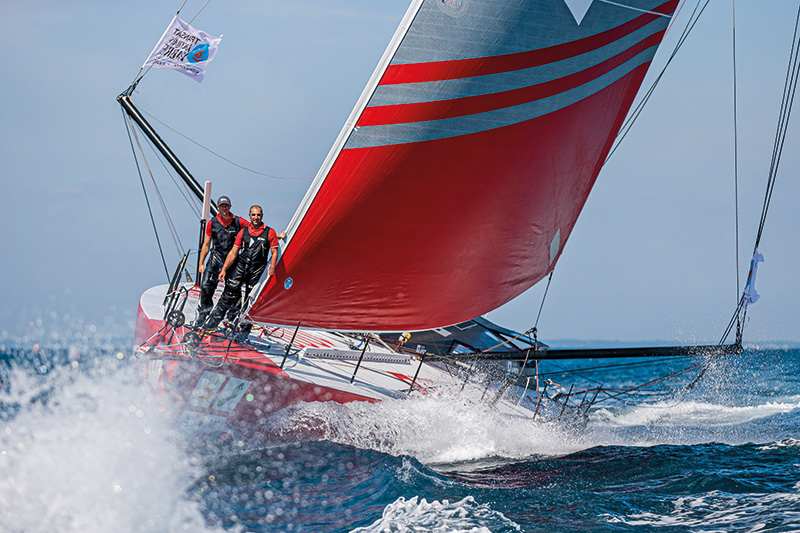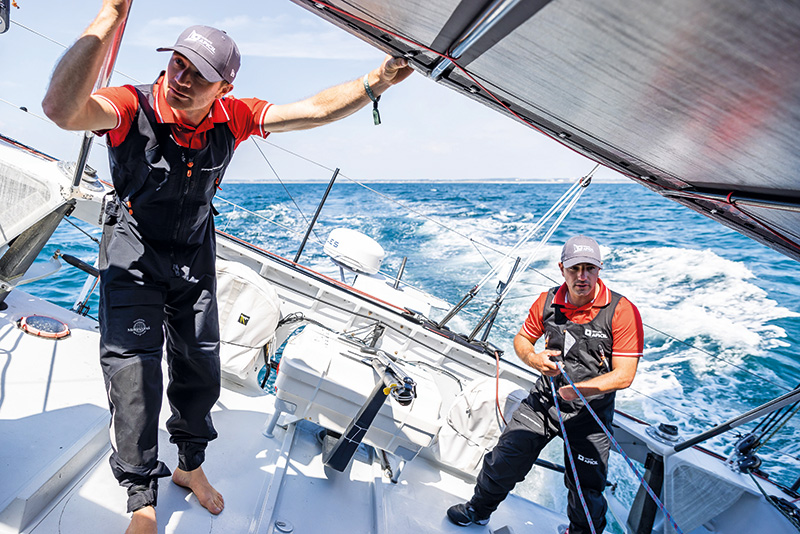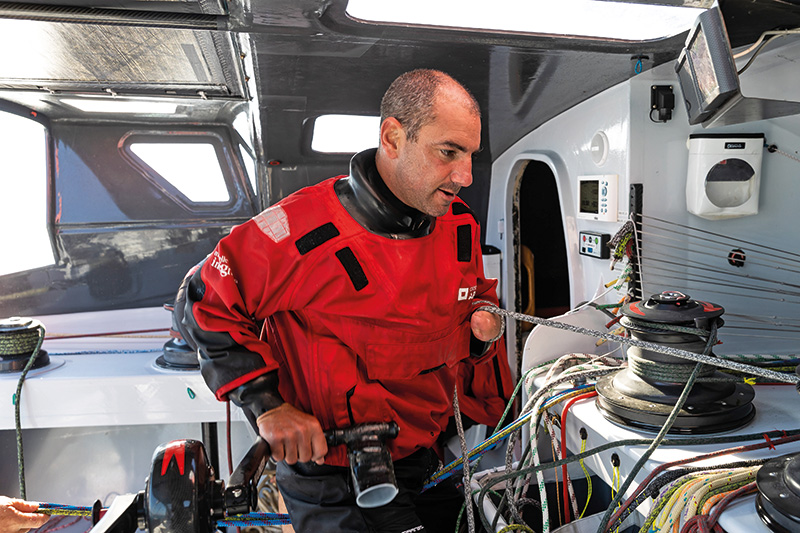
On Sunday, November 28, Damien Seguin arrived in Fort-de France with his teammate Benjamin Dutreux. After a three-week ocean crossing, the Groupe APICIL sailors finished in 11th place in the Transat Jacques Vabre, IMOCA category (single hull sailboats) and first in the IMOCA non-foil class.

ONAIR – Damien Seguin, you are a seasoned sailor, triple Paralympic medalist, and five-time world champion. What are the keys to your success?
Damien Seguin – My entourage! Several people make up my team, each has their area of expertise. The IMOCA boats are “big deals” to manage administratively and technically: composite materials, electronics, sails, etc. Our team was created for the Vendée Globe in 2018 when we acquired this boat, and we have learned all the skills over time.
OA – In addition to these fundamental areas of concern, how do you prepare physically for a race like the Jacques Vabre?
DS – The boat is enormous and requires a lot of physical and mental preparation. At sea, we spend a lot of time under difficult conditions: very little sleep, a lot of humidity, the boat is demanding, the sails are heavy… So, we really need to be prepared. On the physical side, I work on my endurance, on cardio, and I do a lot of swimming and biking. But it doesn’t mean anything to be really strong physically if you don’t work on your conduct and the proper attitude to have on a boat. We also work on other physical qualities such as muscular strength, and the ability to support the lack of sleep and noise using yoga techniques.

OA – When and how did you start sailing? DS – I discovered the universe of sailing and other nautical sports in Guadeloupe. I moved there at the age of 10 and left at 20 to go to a high-level sports training center. My parents still live there. What happened was that I saw the arrival of the Route du Rhum in 1990. That fascinated me and gave me the desire to start sailing. Which I did soon after on an optimist.
OA – You were born without your left hand. Sailing was clearly a desire but in terms of reality, how did that translate?
DS – In the beginning there was a lot of adjustments required: my father and I adapted the boat. My first instructors didn’t really believe I had the capacity for sailing with my handicap. Sailing requires mastering your body in an environment that you can’t master, and it’s very physical. Then it was, “Damien is like he is, and we should treat him just like any kid on a boat.” We developed a relationship that was more positive, and where I had a chance for future progress, when I was about 12 or 13.

OA – When did you decide to dedicate yourself to sailing full-time?
DS – I had graduated from high school and was at the university in Fouillole. It was at that point I decided what to do with my life. My friend, Thibaut Vauchel-Camus, and I were world vice-champions for Hobie Cats. The National Sailing School in Quibron sent us an invitation to start high-level training. And that center thought we could do it: “Those two have the capacity to succeed.” We had potential and lived up to it: we both have a career in this sport and we are both accomplished athletes. Thibaut also sailed in the Jacques Vabre!
OA: So you never gave up!
DS – (Laugh) In fact, I function best with defined goals. When I started my training, the goal was to participate in the Olympic Games. When I started ocean racing, it was to compete in the Route du Rhum. The Transat Jacques Vabre was in perspective of the Vendée Globe…
OA: You are a role model for the next ge- neration and especially those who don’t want to consider their handicap as an obstacle. How do you see yourself in this role?
DS – Over the years, I did in fact become a role model. I was the first skipper to sail in the Route du Rhum with a handicap, and I want to tell kids that it is possible to overcome challenges even if it isn’t easy. It is important that my path inspires others as well. My association “Des Pieds et Des Mains” allows about 100 kids to sail every year. In Guadeloupe and in Martinique especially, it helps sailing clubs or associations be more inclusive, for example, by purchasing equipment adapted to help kids discover the joy of sailing.
A DETERMINED, COMMITTED SAILOR In Paralympic sailing like in ocean racing, Damien Seguin is cresting a wave of success: Triple Paralympic medalist in the 2.4-metre class—gold medal in Ath- ens and Rio, silver in Beijing—and quintuple world champion, who continues to evolve and progress with determination. Early on, he proved that his handicap was not a deterrent to his participation and success in high-level sailing, Paralympic or not. After a terrific sixth place sailing in the Route du Rhum 2018, he at- tacked the Vendée Globe in 2020, an around-the- world race with no stops and no assistance: a first for a one-handed skipper. The Groupe APICIL—a French insurance company—supports his challenges, promoting the concept of sports for everyone and at all levels. That is also what Damien Seguin strives for with his association “Des Pieds et Des Mains.” Fol- lowing a refusal by the organizers of the Solitaire du Figaro to accept his registration because of his handicap, he created the non-profit association in 2005 to “shatter the prejudices against handicaps and create a more inclusive sport of sailing.” As he says: “I was born without a left hand, but they closed the doors simply because I wanted to do like the others. But I never let go of my dream, I wanted my rights to be respected. It’s inconceivable to not give a chance to those who want to really make their dreams come true…! Everyone has the possibility to surpass oneself. Do not give up: that’s how you can push the boundaries. One must continue to dream one’s dreams!”
MORE INFORMATION: https://voile.groupe-apicil.com

